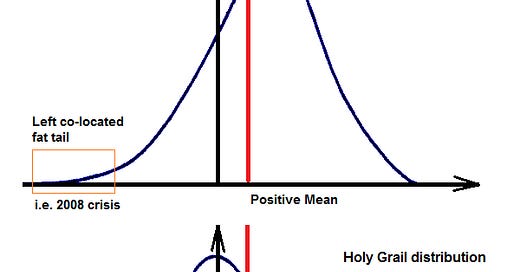
“Tail risk is a form of portfolio risk that arises when the possibility that an investment will move more than three standard deviations from the mean is greater than what is shown by a normal distribution. Tail risks include events that have a small probability of occurring, and occur at both ends of a normal distribution curve.” -Investopedia
A dude that I’ve gone hot and cold on over the years, but someone whose writing, particularly in Antifragile, has been fairly influential on my thinking about football and life in general, is Nassim Nicholas Taleb.
This is the person who coined the popular term ‘black swan’, an event so beyond our popular understanding of the world that it fundamentally shifts our concept of the world. Taleb, however, has been loudly arguing that the current COVID-19 pandemic is NOT a black swan.
And he’s right! The film Contagion, which involves a fictional virus far worse than this one but otherwise gets the science right in almost every respect, was made in 2011! And epidemiologists have been warning us about the likelihood of a global pandemic for decades. In that sense, COVID-19 represents a true tail risk, not a black swan event. I know this personally because the large, public institution I now work for—one that is often criticized for its bureaucracy and sluggishness—had a pandemic response plan in place for years, and was quick and decisive in responding to the crisis.
The reason is that many of the epidemiologists and public health experts that have been warning us for the past two decades work there!
Now, you might think, how can I expect tail risk preparations from an institution as relatively rinky-dink as football?
Well, I would agree that a sport like football doesn’t have the resources or the flexibility to plan for a situation like the one we face today, but I don’t agree that this an excuse for not having a plan in place at all, even a plan that lacked certain specific details. What do institutions like the F.A. exist for, if not for doing some of this long-term planning, taking on some of time and resources to prepare for tail risks on behalf of the teams that play in its leagues?
People, especially politicians, love nothing more than to bloviate about the ‘lessons of 9/11,’ but it seems to me that lesson wasn’t about terrorists or airport security or invading Middle Eastern nations that had nothing to do with it, but instead that world-changing events, whether that, or the 2008 crash, the collapse of the Soviet Union, the entire 1960s, the H-bomb, or World War II, or the Great Depression, or the Spanish Flu, or the Great War and so and so forth, happen with some generational regularity!
Just like we would expect one team to do a Leicester (or, on the flip side, a Borussia Dortmund) now and again, we should maybe listen to experts on the likelihood of certain ‘unthinkable’ events taking place over the next eighty years, including the prospect that football may be unplayable in June and August in two decades time, to take one example off the dome.
So no, I’m not letting football or any other organized sport off the hook for failing to prepare and making financial and organizational decisions on the fly.
But that’s the past. Let’s talk about the present.
A few days ago, my wife sent me a BBC story on the underground caves inhabited during WW2. These weren’t government-planned projects, the result of a grand committee, but a communal enterprise in response to inadequate bomb shelter provisions from the government.
The idea here is that ingenuity tends to shine best in a crisis, and it will emerge in the next few days that some clubs are handling the current crisis better than others. So I would urge clubs, and decision-makers, to start talking to other clubs, conferencing, chatting on Zoom, to see who is doing what and how well it is working. Compare notes, talk about collective actions, don’t wait for the government to save you, because chances are they’re not coming today, or any time soon.
That’s for now…while the future is still uncertain, I would only hope that we don’t forget the lesson here, that we will now understand that the Buddhists were fundamentally correct—the world is impermanent by nature. Our glossy, commercial enterprises, our stock prices, our global economy—it’s all a house of cards. It’s a cold world out there. Don’t get frosty. Get prepared.


